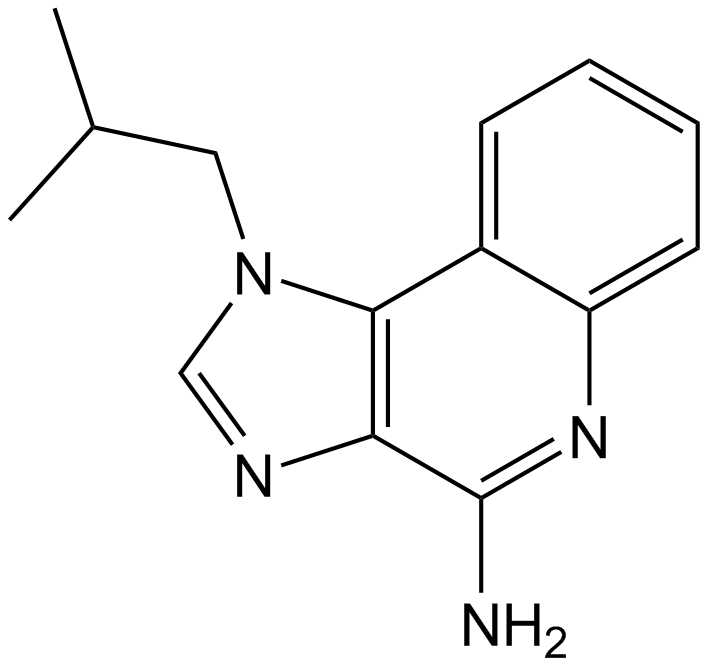Imiquimod (Synonyms: R-837, S-26308, TMX 101) |
| Catalog No.GC16407 |
TLR-7 agonist,immunomodulator with antiviral and antitumor activity
Products are for research use only. Not for human use. We do not sell to patients.

Cas No.: 99011-02-6
Sample solution is provided at 25 µL, 10mM.
IC50: Imiquimod activates toll-like receptor 7 (EC50 2.1 μM) on immune cells and also enables an OGF-mediated block of cell proliferation (IC50 2 μM) [1].
Toll-like receptor 7, also known as TLR7, is protein that in humans is encoded by the TLR7 gene. It is a member of the toll-like receptor (TLR) family. The TLR family plays an important role in pathogen recognition and activation of innate immunity. Imiquimod is a prescription medication that acts as an immune response modifier activating toll-like receptor 7. It is marketed by Meda AB, Graceway Pharmaceuticals, and iNova Pharmaceuticals under the trade names Aldara and Zyclara, and by Farmacoquímica Médica (FQM) in Brazil as Ixium.
In vitro: Results from a previous study demonstrate that imiquimod were capable of inducing interleukin-12 and interferon-g in mouse and human cell cultures. Imiquimod was also found to inhibit IL-4 and IL-5 production in mouse and human culture systems. These data suggested that imiquimod might have clinical utility in diseases where cellmediated immune responseswere important and in diseases associated with overexpression of IL-4 or IL-5, such as atopic disease. [2].
In vivo: The findings from animal study suggested that imiquimod could inhibit the airway inflammation of asthma animals by reducing GATA-3 mRNA and protein expression and increasing T-bet, STAT(6) mRNA and protein expression [3].
Clinical trial: Imiquimod is a patient-applied cream used to treat certain diseases of the skin, including skin cancers (basal cell carcinoma, Bowen's disease, superficial squamous cell carcinoma, some superficial malignant melanomas, and actinic keratosis) as well as genital warts (condylomata acuminata). However, Imiquimod is generally secondary to surgery, because surgery has a better chance to effectively treat at least some forms of skin cancer. Imiquimod has been tested for treatment of molluscum contagiosum. Two large randomized controlled trials, however, found no evidence of effectiveness of imiquimod in treating children with molluscum contagiosum, and concerning adverse effects were also noted. Imiquimod has also been tested for treatment of vulvar intraepithelial neoplasia, common warts that have proven difficult to treat, and vaginal intraepithelial neoplasia.
Reference:
[1] Zagon IS, Donahue RN, Rogosnitzky M, McLaughlin PJ. Imiquimod upregulates the opioid growth factor receptor to inhibit cell proliferation independent of immune function. Exp Biol Med (Maywood). 2008;233(8):968-79.
[2] Wagner TL, Ahonen CL, Couture AM, Gibson SJ, Miller RL, Smith RM, Reiter MJ, Vasilakos JP, Tomai MA. Modulation of TH1 and TH2 cytokine production with the immune response modifiers, R-848 and imiquimod. Cell Immunol. 1999;191(1):10-9.
[3] Yin KS, Jin SX, Bian T, Wu QZ, Wang X, Yao X. The effects of imiquimod on an animal model of asthma. Zhonghua Jie He He Hu Xi Za Zhi. 2007;30(7):509-17.
Average Rating: 5 (Based on Reviews and 33 reference(s) in Google Scholar.)
GLPBIO products are for RESEARCH USE ONLY. Please make sure your review or question is research based.
Required fields are marked with *




















